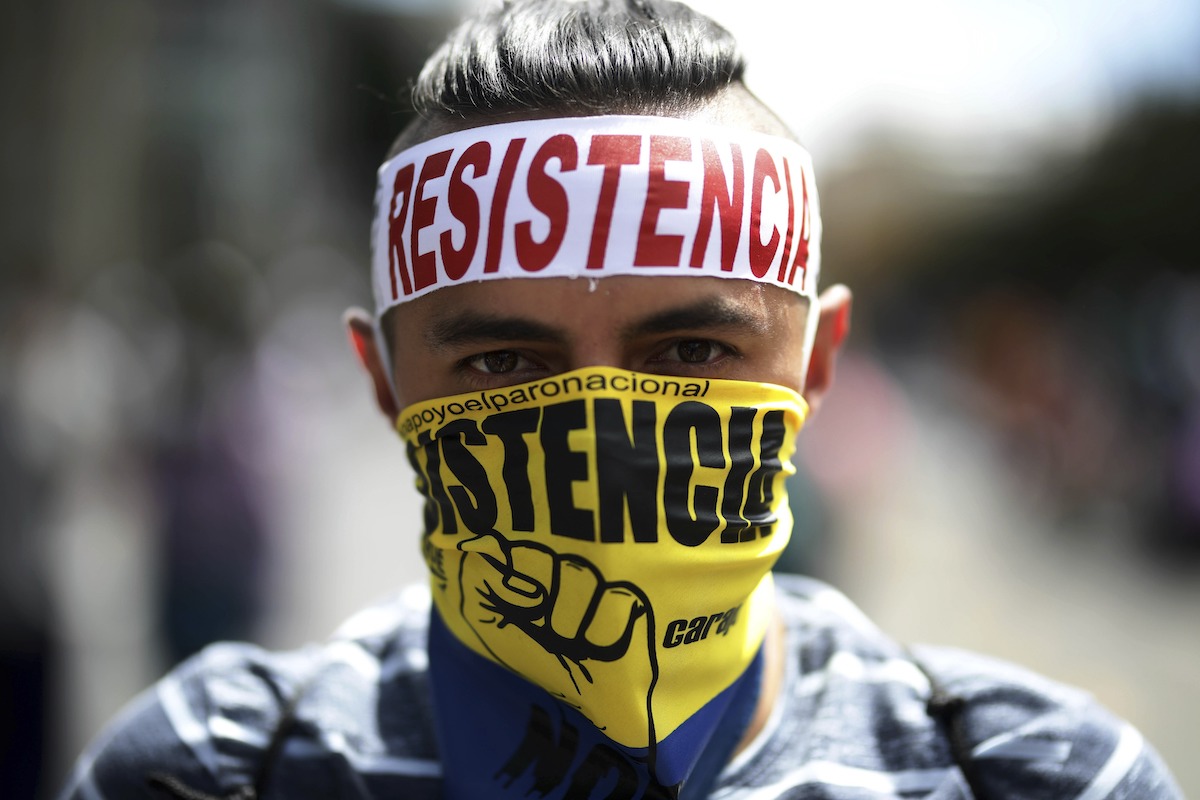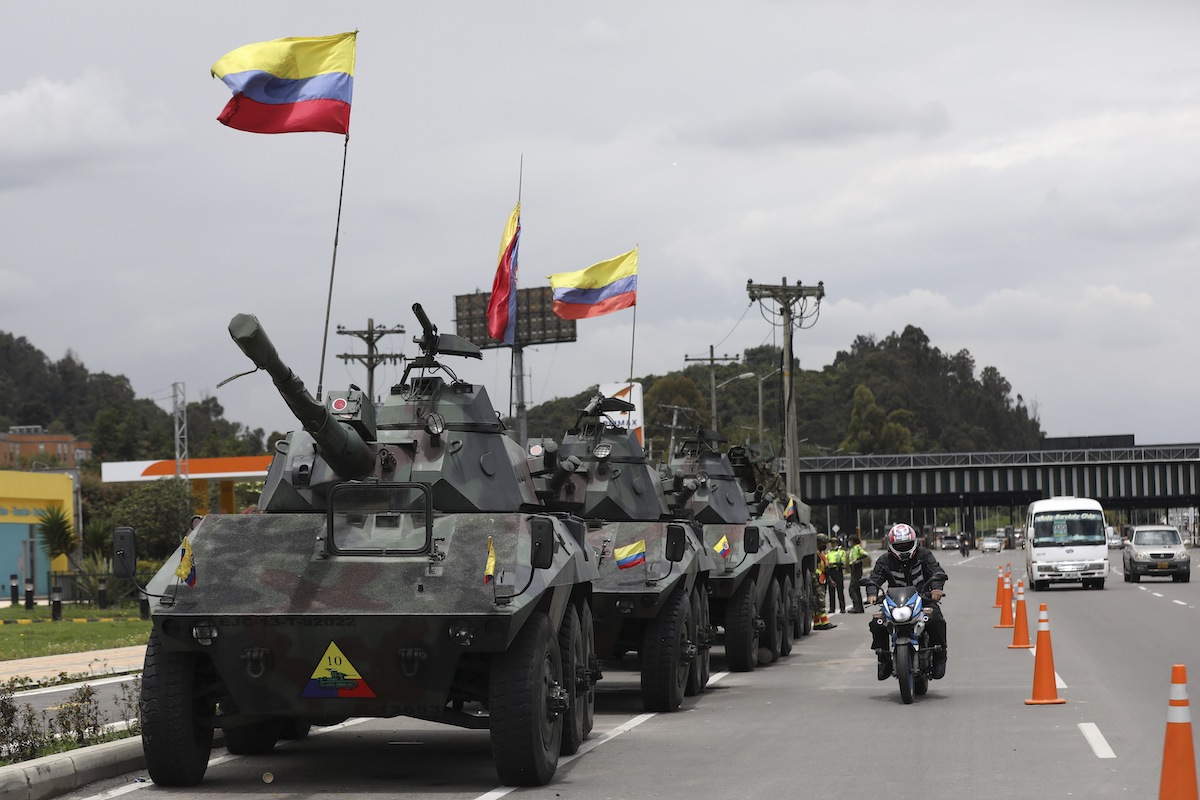

A man wearing the word “Resistance” takes part in an anti-government march in Bogotá, Colombia, Wednesday, May 19, 2021. (AP Photo/Ivan Valencia)
By Jimena Perry and Elizabeth O’Brien
When the novel SARS-CoV-2 virus arrived in Colombia, citizens did their part to stop the spread. For a year and a half, Colombians endured some of the strictest —and initially, most successful— lockdowns in the Americas. They did so without any monetary support from authorities, and many struggled to afford rent, food, water, or other necessities. Long after restrictions had been lifted elsewhere, a nationwide stay-at-home order remained in effect in Colombia. People waited patiently for the pandemic to subside and for vaccines to arrive.
For months, lockdowns succeeded in curbing the spread of contagion. So far, just over 82,000 people have died from COVID-19 in Colombia, a number that pales in comparison to neighboring Brazil, where thousands perish daily while president Jair Bolsonaro turns a blind eye.
But now Colombia’s numbers are looking worse. April’s deaths broke records, and people are under curfew again—but this time, the curfew is because of the government’s brutal response to the wave of grassroots protests sweeping the nation. In 2019, there was another cycle of mass demonstrations and protests that were, in part, truncated by the pandemic. The grievances and demands of people on the streets —though worsened or exacerbated by the pandemic— respond to longstanding social and economic inequities.
The most recent wave of demonstrations began several weeks ago, when president Iván Duque made an ill-considered move, announcing that he planned to implement a wide-ranging new tax structure on goods and income streams such as pensions, basic foodstuffs like eggs and coffee, and public utilities, including electricity and water. He also sought to procure more revenue from diverse economic sectors, including the publishing industry and software development. The nation mobilized en masse, led by youth —who face very high unemployment rates— and representatives from Indigenous, Afro-Colombian, and other severely marginalized groups.
Under the pandemic, the number of people living in extreme poverty had already grown by 2.8 million. The proposed tax reform pushed people over the edge because it made evident the economic and social inequalities faced by the lower and middle class in Colombia—inequalities that were exacerbated by the pandemic.
In the face of impossible economic pressure and the seemingly never-ending pandemic, the tax reform was a breaking point for Colombians. As a result, the social crisis has now begun to deepen the epidemiological situation. Colombians across the country say that there’s no incentive to continue to follow strict lockdown procedures, because they have little hope that the government will support, treat, and vaccinate them.
Although one million Sinovac vaccines arrived in the country on April 27, access remains a problem. Just two months ago, a truck transporting COVID-19 vaccines was hijacked after leaving a distribution center. Other vaccines had to be recalled due to incorrect labeling and contamination. Many citizens have received a first shot with no certainty about getting the second dose.
Videos in recent days show masses of youth and others in the streets —most of whom are masked— calling for governmental accountability and response. During the long weeks of strife, police have responded with unnecessary force, using lethal weapons —including rifles and semi-automatic guns— against protesters around the country. At least 42 protestors and one police officer are dead after a week of unrest during the general strike; at least 250 protestors are also injured from excessive police force. Disturbing recent reports suggest that almost 380 protesters were disappeared (kidnapped or detained) by private or public security forces in the past week.


Soldiers and army tanks guard toll booths to keep protesters from damaging them, on the outskirts of Bogota, Colombia, Tuesday, May 4, 2021. Colombia’s finance minister resigned on Monday following five days of protests over a tax reform proposal that left at least 17 dead. (AP Photo/Fernando Vergara)
In scenes that echo the U.S. last summer, militarized police throw canisters of tear gas, patrol the streets with tanks, and set off sound grenades. Brutal policing has prompted many soundings of concern, including an open letter to president Joe Biden from more than 300 professors and educators in the United States. The letter calls on the Biden administration “to urge Colombia’s government to order its security apparatus to respect human rights, and cease using tactics that escalate political tensions and related violence.”
As Timothy Snyder noted on Democracy Now on January 13 2021: “The word freedom is hypocritical when spoken by the people who create the conditions that leave us sick and powerless… if you deny people healthcare, you’re making them less free. If you put people in unnecessary risk and make them more subject to disease or the fear of disease, you’re making them less free.”
If what happened on January 6 is represents a “sick nation,” tightly wound by the stress of an unprecedented pandemic, what has happened in Colombia recently is partially analogous. But it was not inevitable: it was the result of a government that turned its back on a nation at its most vulnerable, and the result of a dysfunctional global vaccine program. People are tired of being hungry and unemployed, and their hopes for a social end to the pandemic are getting fainter.
Duque has already reneged on his plans for the controversial tax reform. Yet in order to halt the general strike, he will need to show a plan for vaccine access and a commitment to social support programs that would provide cash, food, water, and other basic necessities. Just like in Mexico and elsewhere, the president’s popularity hinges in large part on his COVID responses. And although Mexico’s president has been widely criticized for his lukewarm response, he at least provided monthly payments to the poorest families as well as loans to small businesses.
National responses are, of course, hindered by a weak global health infrastructure that views healthcare as a commodity in a neoliberal marketplace. Vaccine nationalism —which occurs when governments sign agreements with pharmaceutical manufacturers to supply their own populations with vaccines ahead of them becoming available for other countries— has sadly characterized the last eight or nine months of the pandemic, as nations have turned inward and hoped for the magic bullet that would restore their economies. The World Health Organization has repeatedly voiced fears that such unilateral deals with wealthy countries will make the vaccines inaccessible to those in some of the poorest parts of the world.
The WHO has also admonished a “shocking imbalance” in the distribution of vaccines amid the pandemic. One potential path forward would help with vaccine production and distribution. A proposal submitted by India and South Africa in October calls for a temporary intellectual property waiver on equipment, drugs, and vaccines related to the COVID-19 pandemic. If adopted at the General Council, the WTO’s highest-level decision-making body, this could help countries around the world overcome legal barriers preventing them from producing their own Covid vaccines and treatments. Not surprisingly, the proposed TRIPS waiver has met opposition from pharmaceutical industry trade associations, and the plan continues to be stonewalled by the EU, U.K., Switzerland, Japan, Norway, Canada, Australia and Brazil.
Meanwhile, an average of one in four people in high-income nations has received a COVID vaccine, compared to one in over 500 for people in low-income countries. At the current rate, the bulk of the adult population in advanced economies is expected to have been vaccinated against the virus by the middle of next year, whereas the timeline for poorer economies is likely to stretch to 2024 —if at all.
Such a situation was sadly predictable, considering that the Global North has a history of making some diseases —like malaria and uncontrolled AIDS— into problems of the Global South. For decades, antiretrovirals that are free or cheap in the United States are too expensive to afford for those living in Africa and Latin America. In other words, so-called tropical diseases are not naturally occurring: they are made by political neglect, capitalism exploitation, and neocolonial and neoliberal healthcare systems. Nor are vaccines are not a magic bullet for the pandemic: we need healthcare and political justice as well as equitable access to lifesaving vaccines and Remdesivir.
Colombia has shown the world that the social effects of pandemic mismanagement are devastating, even in the absence of a severe epidemiological crisis. COVID-19 did not have to affect Colombia in this way. The international community should act now by denouncing the deadly militarized police response to the general strike, by providing vaccines, and by advocating for a waiver to the TRIPS agreement. Two weeks ago, Joe Biden announced his support for waiving the intellectual property rights for COVID-19 vaccines. We hope that he is able to make this promise a reality.
***
Jimena Perry is from Colombia and is a scholar of Colombian history and politics. She is a Teaching Assistant Professor at Eastern Carolina University and holds a PhD in History of the University of Texas at Austin. Twitter: @jimenaperry.
Elizabeth O’Brien is an Assistant Professor of the History of Medicine at Johns Hopkins University. She studies the history of race, gender, and reproductive politics in Mexico.



[…] boiling over in Colombia over the government, the pandemic, and the newly proposed tax plan. For a good overview on what’s happening, check out these two Ph.Ds outlining the history and context of the crisis. For more on the […]